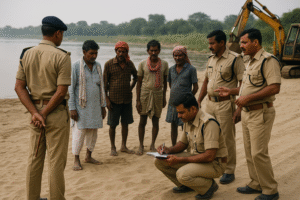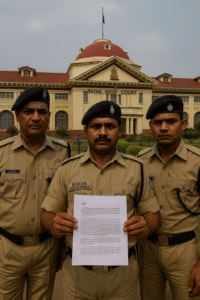The Patna High Court, in a detailed judgment dated 6 April 2021, held that government employees appointed on compassionate grounds after the demerger of the clerk cadre in December 2000 are not entitled to claim the higher pay-scale of ₹4,000–6,000. The Court observed that such appointments are an exception to normal recruitment rules and cannot be treated at par with regular recruits selected through the Bihar Public Service Commission (BPSC).
This judgment, delivered by Hon’ble Mr. Justice Chakradhari Sharan Singh, settles long-standing confusion over whether compassionate appointees could claim the same pay scale as direct recruits appointed pursuant to older advertisements. It dismisses two connected writ petitions — C.W.J.C. No. 7988 of 2020 (Abhay Kumar v. State of Bihar) and C.W.J.C. No. 7965 of 2020 (Digvijay Kumar Singh v. State of Bihar) — after finding no merit in their claim for parity.
Simplified Explanation of the Judgment (in Plain Legal English)
The petitioners were both appointed on compassionate grounds as clerks after the death of their respective fathers, who had been government employees. Their appointments occurred in 2001, after the Finance Department’s Notification No. 8826 dated 20 December 2000, which had demerged the cadre of “Assistant” into two distinct posts — Lower Division Clerk (LDC) and Upper Division Clerk (UDC).
Before this demerger, LDCs and UDCs had been merged into one category, known as “Assistant,” with a common pay scale of ₹4,000–6,000. But after the 2000 notification, the LDC post carried the lower scale of ₹3,050–4,590, while only UDCs retained ₹4,000–6,000. The government also clarified that no direct appointment would be made thereafter in the higher pay-scale and that any ongoing recruitment process should be immediately stopped.
Despite this, the petitioners — Abhay Kumar and Digvijay Kumar Singh — were initially appointed in the ₹4,000–6,000 pay scale. Shortly afterward, the authorities corrected their pay to the lower scale of ₹3,050–4,590, citing the revised government order. They challenged this downward revision, arguing that others appointed later had been granted the higher scale, and therefore they too deserved equal treatment.
Petitioners’ Argument
The petitioners relied heavily on a Division Bench decision in Avinash Kumar Chakerworty & Others v. State of Bihar (L.P.A. No. 167 of 2016, decided on 23 June 2017), which had directed that even compassionate appointees after 2000 were entitled to the higher ₹4,000–6,000 scale, based on parity with regular recruits selected under the 1998 BPSC advertisement.
They further cited other coordinate bench rulings that had followed this reasoning — such as Pankaj Kumar v. State of Bihar (2018), Shalini Priyadarshini v. State of Bihar (2019), and Kundan Kumar Singh v. State of Bihar (2021). The main thrust of their case was that similar employees were receiving the higher scale, so denying them the same treatment amounted to discrimination under Article 14 of the Constitution.
State’s Argument
The State of Bihar, represented by the learned Government Pleader, opposed the claim, arguing that:
- The 1998 BPSC recruits formed a separate class, as their recruitment process had started before the 2000 demerger.
- Compassionate appointees, being appointed after the demerger, could not claim the higher scale.
- Compassionate appointment is an exception, not a right under Article 14, and thus does not entitle one to parity with regular recruits.
- The correct precedent was Smt. Mosarrat Arra Khanam v. State of Bihar (L.P.A. No. 100 of 2012, decided on 19 February 2014), where the Court had rejected similar claims and clarified that compassionate appointees were only entitled to the LDC scale.
They also referred to State Bank of India v. Vindhwashini Devi (2008 4 PLJR 668), which reaffirmed that compassionate appointments are meant to relieve immediate hardship and are governed by policy, not equality principles.
Court’s Analysis and Findings
Justice Chakradhari Sharan Singh carefully examined both lines of precedent and found that the earlier Division Bench judgment in Mosarrat Arra Khanam’s case (2014) had categorically held that compassionate appointees are entitled only to the lower LDC pay-scale of ₹3,050–4,590.
That judgment had clarified that regular recruits under the 1998 BPSC advertisement formed a “distinct and isolated group,” because the advertisement and selection process had begun before the demerger decision. They could not be compared with those appointed afterward, whose appointments were governed by new cadre rules.
The Court observed that subsequent rulings granting higher pay (including Avinash Kumar Chakerworty and others) had not noticed the earlier binding judgment, and therefore, they were rendered per incuriam (i.e., legally flawed for not considering binding precedent).
Agreeing with a recent 2020 ruling (Satish Kumar v. State of Bihar), the Court reaffirmed that the law declared in Mosarrat Arra Khanam remains binding and the compassionate appointees have no valid claim for the higher scale.
Key Observations by the Court
- Compassionate appointments are made to relieve financial distress of the deceased employee’s family and are not equivalent to regular recruitment.
- Pay parity cannot be claimed under Articles 14 and 16 of the Constitution in such cases.
- The date of death of the employee does not determine entitlement; the applicable policy on the date of appointment governs the terms of service.
- Allowing higher pay to compassionate appointees would amount to “compassion upon compassion”, which the Court rejected.
The Court thus dismissed both writ petitions, finding them meritless. No costs were imposed.
Significance or Implication of the Judgment
This judgment is important for both government employees and administrative departments in Bihar because it brings clarity and uniformity in pay-scale disputes arising from compassionate appointments:
- Policy clarity: Only those appointed before 20 December 2000 — or under recruitment processes initiated before that date — can claim the higher ₹4,000–6,000 scale.
- Fiscal discipline: Prevents financial irregularity and inconsistency in government pay structures.
- Fairness in administration: Confirms that compassionate appointments are welfare measures, not a source of regular recruitment benefits.
- Binding precedent: Reaffirms that earlier judgments (Mosarrat Arra Khanam) are controlling law, preventing further contradictory rulings.
For the families of deceased employees, the case clarifies that while the compassionate scheme ensures employment and sustenance, it does not guarantee higher pay or promotional parity with regular recruits.
Legal Issues and Court’s Decision (Summary)
- Whether compassionate appointees after 20.12.2000 are entitled to ₹4,000–6,000 pay scale?
→ No. The Court held they are only entitled to ₹3,050–4,590 as per the revised cadre rules. - Whether earlier judgments granting higher pay were binding?
→ No. They were per incuriam, as they ignored the binding 2014 Division Bench ruling. - Whether equality under Article 14 applies to compassionate appointments?
→ No. Compassionate appointments are an exception, not governed by equality clauses. - Whether pay parity can be claimed with 1998 BPSC recruits?
→ No. They belong to a distinct class whose recruitment process began before the demerger.
Judgments Relied Upon or Cited by Court
- Smt. Mosarrat Arra Khanam v. State of Bihar, L.P.A. No. 100 of 2012 (Patna HC, 2014)
- Satish Kumar v. State of Bihar, C.W.J.C. No. 3438 of 2019 (Patna HC, 2020)
- State Bank of India v. Vindhwashini Devi, 2008 (4) PLJR 668
Case Title
Abhay Kumar v. State of Bihar & Ors. (heard with Digvijay Kumar Singh v. State of Bihar & Ors.)
Case Number
C.W.J.C. No. 7988 of 2020 and C.W.J.C. No. 7965 of 2020 (Heard Together)
Citation(s)
2021(2) PLJR 471
Coram and Names of Judges
Hon’ble Mr. Justice Chakradhari Sharan Singh
Names of Advocates and who they appeared for
- For Petitioners: Mr. Kishore Kumar Thakur, Advocate; Mr. Rajesh Kumar, Advocate; Mr. Braj Kishore Singh, Advocate
- For Respondents: Mr. Ajay Kumar Rastogi (AAG 10); Mr. Parijat Saurav (AC to AAG 10); Mr. Harish Kumar (GP-8); Mr. Binod Kumar Singh and Mr. Shubham Prakash (ACs to GP-8)
Link to Judgment
MTUjNzk2NSMyMDIwIzEjTg==-pmboE2DvWDU=
If you found this explanation helpful and wish to stay informed about how legal developments may affect your rights in Bihar, you may consider following Samvida Law Associates for more updates.








